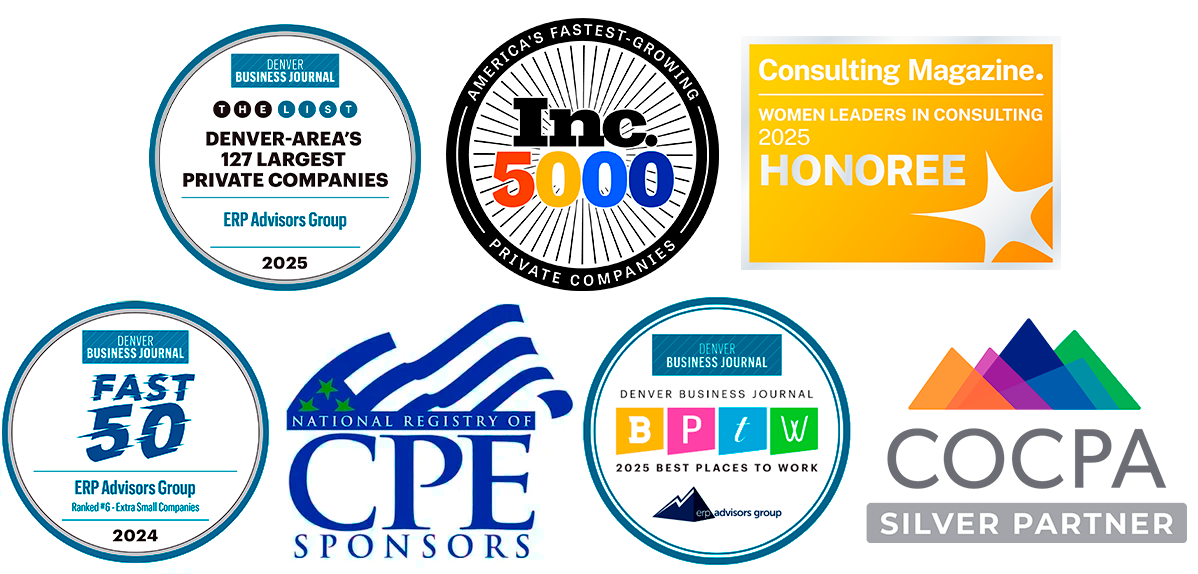
Navigating the complicated world of ERP selection can be difficult, especially when you have never confronted a project of this magnitude. The best place to start is by formulating the most important questions your team should be asking when vetting an ERP solution, vendor, and implementation partner.
How do you know what questions you SHOULD ask an ERP vendor? You may be tempted to start your ERP search by contacting the vendors to lead you through the process, but this is a rookie mistake that can cause you frustration and confusion because the software vendor’s job is to sell software, not advise you on your business. Therefore, you have some homework you need to do before you can have productive conversations with the vendor. The viewpoint you should assume when meeting with vendors is one where YOU are driving the conversation to get YOUR questions answered. However, you will need to understand what the software needs to do for you and then let the vendors answer whether their application can or not through a series of meetings, demonstrations, and presentations.
To prepare for meeting with vendors, you may need to pour a significant amount of time into deeply understanding your business requirements. Consider organizing background information about your company in preparation for your vendor meetings. This will also show the vendors you are more of a qualified buyer too and will get you more attention from them. The people you initially talk to are salespeople only and are not very technical. To get future meetings with technical salespeople, you will need to prove to the vendor you are a serious buyer who knows your own needs because you can already articulate what you do need versus what you don’t need.
Depending on your role in the company, you may have a broad understanding of the company’s strategy, business processes, pain points, and unique distinctions. But if you were “voluntold” to head up the ERP project, and you are normally focused on your own departmental work, you may need to round up new information so you can speak intelligently to the vendors. Here are the types of information you should organize into a prep document before contacting vendors:
- Company’s industry, key products and services, and selling model.
- Annual revenue
- Number of Employees
- Names of current systems you are considering replacing.
- Project drivers, why you are considering this purchase, and why now.
- Knowledge of other systems that could be included in an ERP replacement.
- Major investments in key systems that are definitely not being replaced, like the CRM, eCommerce solution, or Product Lifecycle Management tool.
- Number of locations for stores, plants, warehouses, distribution centers, offices, etc.
- Geographies with operations and whether included or excluded in the ERP project.
- Languages, localizations, or currencies if you have international requirements.
- Knowledge of the main business processes which need to be included in the new solution as well as adjacent processes which are opportune to include.
- Unusual or industry-specific requirements like FDA validations, ITAR, government contracting, and job costing.
- Key systems you hope to integrate into the new ERP.
With this information in hand, you can pre-qualify vendors very rapidly and usually determine whether the vendor should be brought forward or left behind. Without this knowledge of your own company, the questions you ask the vendors will be less meaningful to you.
Vendor Background
Start with the baseline questions to get a feel for the fit and viability of the ERP vendor. This is the most basic part of the vetting process that will determine if there is a need to go any deeper with the vendor. If they do not have solid experience with other customers in your industry with similar unique requirements, you should not continue pursuing them.
- How many years have you been in business?
- How many employees do you have?
- What types of products or services do you offer? Get a high-level summary of the products they support. This can help you understand if the vendor only dabbles in your industry or devotes the lion’s share of resources to it.
- What is your ownership type? This may seem like a random question, but it gives you significant insight into how they will operate as partners with your business.
Application Background
Gathering application background at this point in the process is meant to garner a general understanding of the recommendations that the vendor or implementation partner would make based on your high-level requirements. This encourages the quick elimination of teams who are clearly poor fits for your unique requirements early in the process.
- What is the name of the application you would recommend?
- Now is when you will need to provide the background about your own company so the salesperson can correctly determine the products that fit your business.
- How many customers do they currently have?
- If you only meet with one or two vendors, this may not seem very relevant but when you ask this question across many vendors, you will get the picture of viability and pervasiveness in the market. Asking about how many customers they have in your country is also important as some vendors are only prevalent in certain countries. Finding resources locally might be difficult if you need international help.
- How is the application priced?
- The vendors can give you high-level information only before discounts, customizations, data migration, and implementation services. Those other costs can be deceiving. However, getting a feel for annual costs for your approximate number of users and modules can help prepare you for the right ballpark budget +/- 50%.
- What are my deployment options?
- For some applications there is only one deployment; others have a multitude. Some companies are hesitant about cloud-based ERP solutions, so it is beneficial to know in the beginning if there are any options for hosting it yourself on-premises or in your own cloud environment.
- How many customers do they have in your industry?
- This will get you an even better feel for which vendors are experienced at serving customers like you versus those who aren’t. Sometimes you may opt to be the pioneer for an application, but other companies may not have the tolerance to “be the first.”
From here, you can go slightly deeper into specific, core requirements that would be met by the application, including accounting, reporting, manufacturing, integrations, and other capabilities based on your unique needs or industry.
Who Performs the Implementations?
This is a vital step in the vendor selection process because it will be your first look into the team you could be working with for the life of your new ERP. The right team could make or break your ERP implementation, so it is best to consider this important piece at the start. Sometimes the implementation partner is a SEPARATE company from the vendor. If you are starting over with meeting a new company for implementations, make sure to include the relevant questions above in addition to the next questions.
- Are your implementations performed through partners, direct, or by another party?
- What experience do you have with similar customers?
- Do you have several references in our industry? They do not need to provide them at this time, but they will so it is important to know that they are prepared.
- When will you introduce implementation resources during the selection process?
- Do you have experience implementing in countries that we would need? This can be a BIG differentiator for a small to medium-sized international company that doesn’t want to hire the Big 4 just to get international resources.
- What products do you implement and what is the division of resources across the products at your firm?
- This will help you to know if the services you are inquiring about are “second string” or their main focus.
At this step, you should also ask for high-level cost estimates, broken down per user, each module, etcetera to ensure that you have a general idea of what the software will cost. While the implementation partner may be hesitant to provide definitive cost estimates without knowing the full scope of work, they should still provide a transparent estimate to prepare your team for expected costs.
Why It Matters
If your business is unprepared, you will not be able to ask the right questions to set your ERP selection up for success. The wrong questions or a lack of questions will create confusion surrounding your selection, either leaving you with too many solutions to choose from or applications that will be unfit for your business. This guide will provide you with a roadmap for navigating the ERP selection process to match you with a vendor who will not only meet your business’s needs but also your culture and experience. Need more help? Contact an expert ERP Selection Consultant at https://www.erpadvisorsgroup.com/contact.

